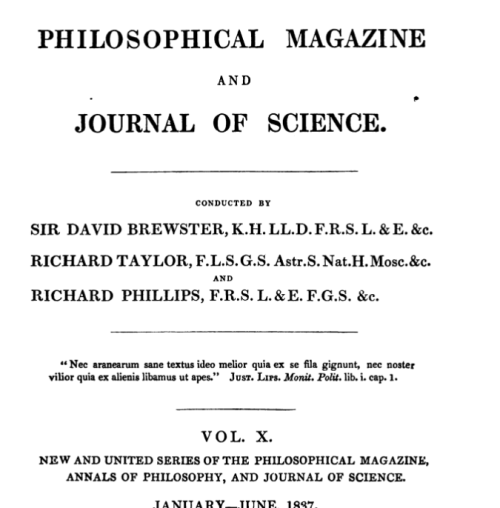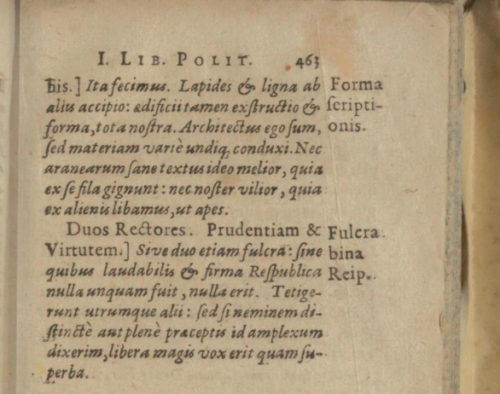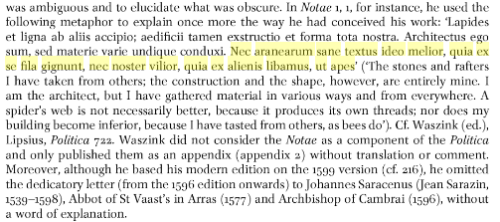JF Ptak Science Books Post 2641
 I'm a fan of some sorts when I see a string of abbreviations, the writer writing for a sympathetic readership with at least a common interest in the subject, knowing that spelling everything out isn't quite necessary, especially if space is an issue. On title pages this happens often with the academic heritage and awards of the author, as well as with quotes, which is where my staccato of abbreviations was found.
I'm a fan of some sorts when I see a string of abbreviations, the writer writing for a sympathetic readership with at least a common interest in the subject, knowing that spelling everything out isn't quite necessary, especially if space is an issue. On title pages this happens often with the academic heritage and awards of the author, as well as with quotes, which is where my staccato of abbreviations was found.
The "misunderstanding" here occurs in the reference to the source of the quote, which has lead me to look at a number of different editions of various works by the author. It seems that I am missing something big in finding the source of the quote, because it seems impossible that an attribution right there in the middle of the title page of one of the most significant scientific periodicals of the 19th century will surely not be incorrect.
First, the abbreviation for the origin of the quote ("Nec aranearum sane textus ideo melior quia ex se fila gignunt, nec noster
vilior quia ex alienis libamus ut apes.") starts out beautifully with "Just. Lips." followed by "Monit. Polit. lib. i. cap. 1."
This is simply the name of the author and the work and page on which the quote is found: initially I thought I was dealing with Justus Lipsius'1 Politicorum sive civilis doctrinae libri sex : qui ad principatum maxime spectant. Additae notae auctiores, tum et De una religione liber..., printed at the Plantin Press in Leiden in 1589, book one (of the six books/sections comprising the work, or "libri sex"), chapter one.
I don't know the quote, and even though I have been working with the Philosophical Magazine for quite some time, I never had bothered to to it up until a few days ago, when I bumped into this question. The thing is, the quote doesn't really appear in I/1--it does appear in the Additae Notae section at the end of the book, on page 463, referencing I/1 on page 12.
Then I figured out that this seemed to not be the correct book, although the quote was more-or-less placed correctly. The "Monit" part of the extended abbreviations refers to Lipsius Monita et exempla politica : libri dvo, qui virtvtes et vitia principum spectant...2(1609), in which I did a text search for keywords and the quote but could not find it, which further confuses a matter that may not be confusing to someone more familiar with these works and era.
It seems impossible that the Phil Mag would be in error here on the issue of referencing a great classic and that it must be that I'm just missing something, and no doubt someone reading this will let me know.
In any event I thought I'd share this little ride I took on the back of this quote...which, by the way, along with the sentence preceding it, is quoted and translated in The Reception of Erasmus in the Early Modern Period, edited by Karl A. E. Enenkel (page 188. below):

Image source and full text at Internet Archive: https://archive.org/details/imgPiz59MiscellaneaOpal
Which in a sense is similar to the Newton/shoulders-of-giants quote, here the writers building upon that which has come before and making something different of it.
Notes:
1. Justus Lipsius "...humanist and classical scholar...(Joost Lips, 1547–1606), described by his admiring correspondent Michel de Montaigne as one of the most learned men of his day (EssaysII.12), was the founding father of Neostoicism, a key component of European thought in the late sixteenth and seventeenth centuries..."--Stanford Encyclopedia of Philosophy (online))
2. Lipsius' work can be seen here at the Internet Archive: https://archive.org/details/ivstilipsimonita00lips




Comments